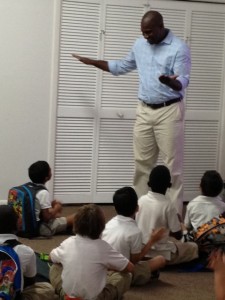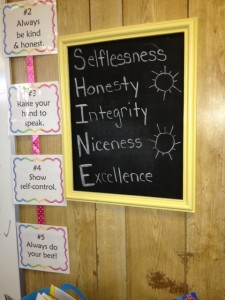Twenty-three second-grade boys sit cross-legged on the lunchroom floor in diagonal rows known at this Bradenton, Fla., charter school as the “rays’’ formation.

That’s because the boys are considered little “SUNS,’’ radiating Selflessness, Honesty, Integrity, Niceness and Excellence – or SHINE. It’s the Let Your Light Shine motto at the new Visible Men Academy, where organizers deem character development as important as academic success.
Founder and principal Neil Phillips got the idea for an all-boys charter school from a nonprofit network he started five years ago to connect black boys with black male role models. Program coordinators kept telling the Harvard grad and former professional basketball player, “If only we had more time’’ with the boys.
“That planted the seed,’’ Phillips said.
Visible Men Academy opened in August, leasing space from a community church to teach 73 students in grades K-2. It’s the second single-gendered charter school in Manatee County and the ninth such school in Florida, where the concept is on the rise. In 2009-10, state records show one single-gender charter school. Three years later, there were eight.
Such schools are still rare – fewer than 1 percent of all charters nationally, according to the National Alliance for Public Charter Schools. And Florida Department of Education officials say they don’t know why there’s an increase. It just seems to be a natural direction for a school choice model that sells itself on offering parents and students an ever-widening array of options. 
Charter schools are public schools that function independently from school districts. Some focus on science and math, others on the environment or the arts. The single-gender structure is just another option, and one that’s common in private and parochial schools. Even traditional district schools are trying it, with proponents pointing to improved academic achievement and fewer discipline problems.
The idea is to build upon research that shows some boys and girls learn differently. In some single-gender classrooms, girls sit in clusters so they can talk face-to-face – and frequently – while boys have schedules that allow more breaks for physical activity.
Last year, Just For Girls Academy opened in the same Florida city with a focus on helping girls succeed in reading, math, science and technology – and boosting their confidence. The K-4 school with 102 students is an offshoot of a local girls club.
“Research shows that girls thrive in an environment like this,” said Principal Jennifer Rosenboom. “And our parents wanted a place where their daughters could be safe and flourish.’’
Phillips has a similar outlook at Visible Men Academy.

The school, a former church, is named after his nonprofit, Visible Men – a nod to Ralph Ellison’s classic novel, “Invisible Man.’’ It’s a powerful story of a black man so oppressed, he remains nameless throughout the book.
The network’s mission: to elevate black boys and men to new heights of achievement, fulfillment, happiness and social contribution. Phillip’s school shares in that goal, but takes it a step further by including boys of all races and backgrounds.
The majority of students come from low-income families, with many living in the neighborhood where the closest elementary school is rated F by the state. Ninety percent of the students are black and Hispanic; the rest are white.
Academics aren’t the only thing they’re learning.
“Talk to any adult about their success and work ethic, persistence, resilience, respect for others … those are all the things that we know really contribute to success and fulfillment,’’ said Phillips, who has experience running private schools. “It’s not character development or academics. It can and should be both.’’
Emilia Rodriguez noticed an immediate change when her son started second grade at VMA. “There’s no more baby talk,’’ she said. “Just after a few weeks, he’s talking like a big man.’’
And opening doors for others, taking more time to pack his book bag and making sure he has everything he needs for the day. There’s also no more daily drama of different girlfriends, like at his former district school, mom said.
“They are still boys,’’ she said, “but he’s learning how to manage that. He’s a more serious student, taking life more seriously.’’
Rodriguez went to every meeting organizers held before the school opened. Now she volunteers regularly. “I really want this school to become more successful,’’ she said.
The school operates on a $1.8 million budget with local and national support, including a grant from the Florida Charter School Growth Fund. The money is doled out incrementally, as the academy reaches certain benchmarks with enrollment and academic achievement. 
The growth fund, affiliated with a national philanthropic organization based in Colorado, put Phillips in touch with some of the highest-performing charter schools in the country run by KIPP and Rocketship Education. That helped shape VMA, which replicates many of the features used by the national brands. It employs a longer than average school day (8 ½ hours), and devotes an additional 90 minutes of instruction to remediation for struggling students and enrichment for advanced students.
The school calendar at VMA is longer, too: 205 days compared to the Florida district average of 180. The extra days include one Saturday session per month.
Efforts to reach boys specifically include Solar Time, where they get to watch a video or stand up and move around the classroom. There are also laptops and iPads with all kinds of applications.
“We use technology primarily for the engagement factor,’’ Phillips said. “With very young people in general, and boys in particular, the fact they’re touching things gets them engaged in learning.’’

Then there’s the sun rise gathering, where the “SUNS” line up as “rays.” Phillips greets each youth by name and they take turns complimenting each other for “shining’’ when they do good deeds. They sit quietly in their white polos and khakis, basking in the attention.
“When I look into their eyes, they remind me of my own,’’ Phillips said. “I had a lot of people in my life who helped me. I was capable academically, but if not pushed I would coast.’’
Now he’s the one doing the pushing.


